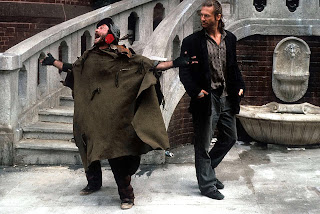By Michael Lyons
The Fisher King is a true original. If you've never seen it, stop reading and watch it - it's a film unlike any other. If it's been a while since you've seen it, well, it celebrates its 30th anniversary this month, so it's a perfect time.
Watching The Fisher King today, in our era of remakes and reboots, it's easy to forget that, at one time, films like this, with their unique perspective and meaningful messages, were commonplace among big studio releases.
However, even when it was made in 1991, The Fisher King was looked at as an anomaly, as the film's screenwriter Richard LaGravenese remembered in a 1995 interview. "I wrote The Fisher King during a Writer’s Guild Strike," recalled LaGravenese. "So I had to wait until after that for someone to read it. Then, two weeks after the strike ended, it was bought. And I remember the executive of the studio telling me, ‘It's so amazing. We all thought that during the writers’ strike, when every writer had this time to work on their own, that they would have written a lot of personal, original work. But then we were all amazed that after the writers’ strike, we got flooded with cop-buddy movies.’ They were so surprised when Fisher King came along. It kind of stood out."
And stand out, it does. The Fisher King tells the story of a spoiled, self-absorbed, popular radio DJ "shock jock," named Jack Lucas (Jeff Bridges), who makes a flippant remark on the air that leads a listener, who has called into his show, to commit a mass-murder/suicide at a trendy Manhattan restaurant.
The film flash-forwards several years later. We find Jack, his career presumably ended due to the event, now despondent and drowning himself in alcohol, working at a video store owned by his girlfriend, Anne (Mercedes Ruehl, in her Academy-Award winning role).
One night, a desperate Jack sets out to commit suicide and is attacked by a group of thugs. However, Jack is rescued by a homeless man named Parry (Robin Williams). Jack learns that Parry is somewhat delusional, believing that he is on a quest to find the Holy Grail.
Parry relays the tale of The Fisher King to Jack. It seems the King was charged with claiming the Holy Grail but could not obtain it. Living out his life, wounded and depressed, the King would be visited one day by a Fool, who brought the King some water. The King discovers that he is drinking the water out of the Holy Grail he has been seeking, brought to him by a Fool, who simply did so out of kindness.
The story is a beautiful metaphor for what is at the heart of the film The Fisher King, as Jack hopes that by helping Parry, he can redeem himself.
"I was fascinated by this height of narcissism that hit in the 80s," recalled LaGravenese of his inspiration for The Fisher King. "I wanted to write a story about a narcissistic man who, by the end of the movie, commits a selfless act. That's really all I had, and it took three or four drafts of completely different stories, completely different movies with different plots, but the same characters. With each draft, I got closer and closer to what ultimately became The Fisher King."
The film unfurls more like a novel than a film. The characters have depth, and as an audience, there is a sense of their background and personality before it's even revealed. Additionally, The Fisher King also employs foreshadowing and symbolism to tell this compelling story of unselfish acts and kindness changing lives.
The film's director, Terry Gilliam, who started with the famed comedy troupe Monty Python, had primarily directed off-beat fantasy films, such as 1981's Time Bandits and 1988's The Adventures of Baron Munchausen, but brought this "otherworldly" tone to The Fisher King. It works perfectly in the film, balancing Parry's hallucinatory life and mission for the Grail with the contemporary setting of New York City (a scene with a knight on horseback charging through the city street is a wonder to behold).
At times, Gillian can make Manhattan look ethereal, almost medieval, which provides The Fisher King with a fable-esque tone, particularly a dream sequence involving waltzing commuters in Grand Central Station.
Gilliam also understood the power of the film's story and wanted LaGravenese to be on the set during filming (a rarity for screenwriters). "He comes from a background where you protect the writing," said LaGravenese of Gilliam. "That's what he knows, and that's what makes sense to him. He doesn't really understand how anyone could do it any other way. So, we had a close relationship throughout the film."
Also buoying this story are memorable performances. As Jack, Bridges slowly melts away the shallow nature of the character and makes him sympathetic. Williams (who earned an Oscar nomination) delivers one of his best performances, balancing manic with tragic.
Ruehl deserved her Oscar for an authentic, heartbreaking role, and Amanda Plummer, as the shy woman who falls for Parry, delivers a heartfelt, subtle performance. Also, as a homeless man obsessed with Ethel Merman, Michael Jeter, steals every one of his brief scenes.
And all of this comes together with a tremendous amount of sharp and quirky comedy. "There are three things in this world that you need," declares Jack. "Respect for all kinds of life, a nice bowel movement, and a navy blazer."
Released on September 27, 1991, the original poster for The Fisher King stated that the movie was: "A modern-day tale about the search for love, sanity, Ethel Merman and The Holy Grail." And, at the center of it all was heart, as the film dares to be a parable of how we can all live our lives just a little bit better.
Three decades later, The Fisher King is still a true original, indeed.
Sources:
IMDb
Interview with Richard LaGravenese, December 21, 1995


No comments:
Post a Comment